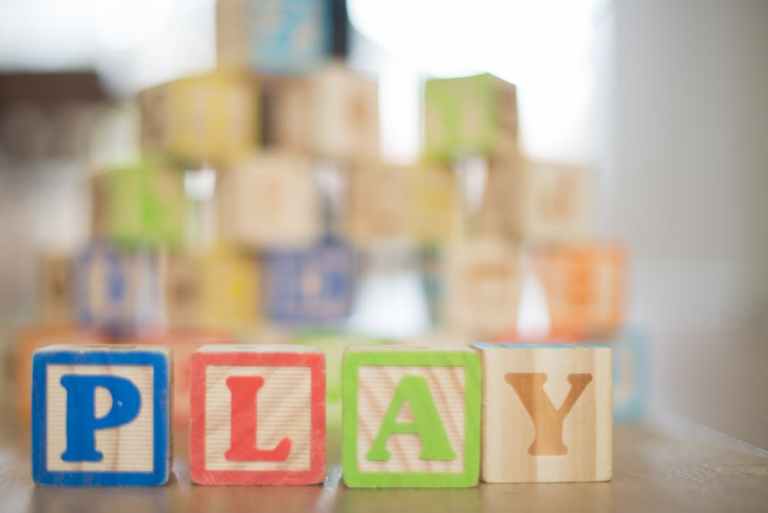
How Being a Child Life Specialist made me a better Pediatric OT
It’s often confusing for people to hear that I pursued the career of a Child Life Specialist (CLS) around the same time I was finishing up my Master’s in Occupational Therapy (OT).
Is Child Life a subdivision of OT? Is Child Life similar to OT? Why did you become a Child Life Specialist – were you not satisfied with your OT career? – are just some of the many things I’ve been asked.
I get it.
Well to start, Child Life is not a subdivision of OT. In fact, Child Life is an entirely different certification and training. As a CLS I am trained to help children cope with the stress that comes along with any medical experience (ie. a hospital stay, Emergency Room visit, surgery, bloodwork – to just name a few). In efforts to help children cope and deal with their anxiety in a medical setting, we provide developmentally appropriate education, procedural prep, distractions, medical play, normalization and recreational activities, sibling/family support, non-pharmacologic pain management and even bereavement and end of life support.
As a Pediatric OT who works to help children with developmental delays gain functional skills, my Child Life training has enriched my work in so many ways. I absolutely love what I do as an OT. But after realizing the significant levels of stress my kids with Autism, ADHD and developmental challenges exhibit on a day to day basis, I wanted to become more skilled in supporting them emotionally before I can tackle any motor skills with them. And that’s exactly what the field of Child Life did for me.
Here’s a littkle break down on how the field of Child Life has enriched my work as a Pediatric OT:
Coping in Hospitals
I knew that no matter how amazing of an OT I was meant to be or how well thought out my treatment sessions could be, if my pediatric patients are not coping well with being in a hospital setting, then in one way or another my sessions may be lacking. In order for my patients to be more receptive and engaging in a therapy session, they must feel comfortable and safe within the setting and with those they are interacting with.
OT’s who are working in a hospital setting – whether it’s outpatient, inpatient, acute or subacute – should be prepared to deal with children who associate the hospital setting with fear, anxiety and stress. This may be due in part to a past medical experience that did not go as well or perhaps an encounter with a medical staff that was not so pleasant.
A CLS can help ease the transition to medical settings in various ways. A CLS may debrief with a child regarding their past experiences or encounters, they may engage in medical play for the purpose of developing positive association to medical equipment as well as addressing fears in a safe space, they provide normalization activities to make the hospital environment less frightening, and they provide procedural prep for all events occurring during their stay.
Coping Skills during Anxious times
As a school OT, a lot of the children I work with deal with anxiety in similar ways a child at the hospital experiences anxiety. For my kids in the school setting, the anxiety may be due to a change in routine (such as the teacher being absent and thus having a substitute), unmet sensory needs, challenges in communication skills, pain, etc. I often carry my child life toolkit to help children relieve this anxiety before it escalates. Some things I have are bubbles or a pinwheel for deep breathing, sensory toys, distraction games such as iSpy, a stress ball, fidgets, and glitter wands.
Education
As an OT, part of our essential role during treatment sessions is to provide patient education on how to appropriately and effectively continue treatment at home. How we implement that education for the different age ranges is not something I was give extensive training in as an OT student.
However, as a CLS we are certified and trained in providing education that is developmentally appropriate for each pediatric age group while knowing how to assess which developmental level the child belongs to. Having this training makes it easier to connect with that child and ensure they are understanding the information in a way that best meets their developmental level.
A child is more likely to continue therapy at home if the education is provided in a way that best suits their understanding through developmentally appropriate language and visual supports (ie dolls, images, videos etc).
Trauma
Stress in inevitable in all children. I’ve had students during my OT sessions who were completely distraught and unable to focus on their work due to what’s happening at home – ie. parents getting a divorce, the loss of a parent/grandparent, the loss of a pet, moving, etc. This inevitably affects a child’s performance at school and should not be overlooked.
One of my students, who was unfortunately mourning the passing of her dog, was unable to work on her OT goal of writing. Our typical OT session involves writing 2-3 age appropriate sentences with a focus on her letter formation, spacing and alignment in addition to an activity working on her fine motor development (ie. strengthening the small muscles of her hands). Keeping those goals in mind while acknowledging her need to cope, I realized it was more therapeutic for her to write a memoir of her dog as a writing task, or creating a memory box with popsicle sticks for a fine motor activity. That way, although she no longer had her dog, she can still hold on to something tangible indefinitely. These activities not only became a motivating factor for this student to continue working on her OT goals, but they had a huge therapeutic component which was most important of all.
Restoring Family Bonds
As a CLS, we restore the parent- child bond or sibling-child bond when family dynamics change. Parents often feel guilt from their child’s condition or may even struggle coping with their own stresses. A CLS makes sure to work on the family-child relationship as it affects all aspects of the child’s life.
I had a student for OT who unfortunately did not know her father had passed away a year ago. As any young six year old child, she was eagerly awaiting her father’s return from his ‘travels’. I soon found out that it was mom’s personal decision to keep this secret from her daughter in fear of how she may react. The student, who started to grow worrisome of her dad’s absence and may have gotten an idea of his reason for not returning home from older siblings, started to grow resentment towards her mother.
I spoke to the mother about the importance of telling her daughter the truth and the negative impact this can have on the parent-child trust. The concerned mom knew she had to break the news to her daughter but was struggling with the ‘how’. That’s where my CLS side was able to help. I was able to provide her with appropriate resources as well as information for support groups, leaving the mother full of gratitude and relief.
Had I not had that training as a CLS, I may not have felt comfortable having this conversation with the mom, let alone have those resources at hand.
Coping Skills for Family Members
As mentioned before, a family’s way of coping with a stressful life event inevitably affects the child’s own coping skills as well as their perception of the situation. Since a family’s style of coping is an influential factor to a child’s coping skills, a CLS can help families develop appropriate coping skills to better support themselves and their children.
Play
Play is the natural language of all children and an essential occupation for kids as well. It’s always great to be able to use play as a means to not only achieve pediatric goals as a CLS but as an OT as well. Having a background in Child Life has made me more creative in providing playful ideas when working with the pediatric population in addition to giving me more training in play based therapy approaches.
Whether I’m helping a child learn to manage fasteners, buttons and zippers on a toy doll in my OT session or teaching an IV prep on a similar doll during my Child Life session, I’m always appreciative of the fact that I can use this natural medium to help children learn and understand the world.
Creating Sensory Environments
As a means to help children cope in medical settings, a CLS aims to provide a calming sensory environment in what can be a highly overstimulating scenario. With that additional training in creating optimal sensory environments, I am more equipped at helping my children with sensory challenges during my OT sessions as well.
The extensive training in creating optimal sensory environments has helped me tremendously as a CLS as well. As a CLS and advocate for our Pediatric Emergency Department, I am now on the team to create the very first sensory room for our Pediatric ER! I’ve had the pleasure to use my training from both fields to come up with an amazing design for the sensory room that will help destress an anxious child before and/or after their ER visit.
With that being said, I also have the pleasure to be an ongoing guest lecturer for a Child Development Course where I teach Graduate Students of Education on how to create an optimal sensory classroom for their special needs students. Giving my graduate students strategies from both a CLS and OT perspective has been greatly insightful and well received.
Helping Children of Adult Patients
Although I do not work with the adult population, CLS are also needed there. Not only does a CLS get called to support an adult who has developmental delays but they support an adult patient who may have children that are not coping well with the parent’s illness. Whether the parent has had a traumatic injury, a chronic illness, are in a coma or are preparing for end of life, the CLS can provide developmentally appropriate prep for the children as well as facilitate appropriate bonding activities specific to that child’s coping needs.
End of Life
End of life and bereavement support has always been the most challenging area to address even as a Child Life Specialist – making it that much more vital to our skillset. Having a pediatric patient who may be approaching end of life is something any pediatric healthcare worker should be ready to face. A CLS is trained to support a child and their family during this time and facilitate memory making activities for the families and their loved ones.
Questions?
If you’re a Child Life Specialist, Occupational Therapist, student in either field or someone who is interested in pursuing either career (or hey, both!) please feel free to reach out with questions. I will be sure to respond!



